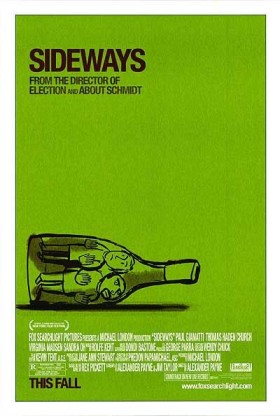|
Sideways
Many
have already read the buzz on this latest effort by Alexander
Payne, who jumped into notoriety back in 1996 with Citizen
Ruth, and hit it big with Election in 1999.
The
early word is another nomination for Paul Giamatti who plays
Miles, a depressed writer/divorcee struggling with his own
issues while determined to give his friend Jack (Thomas
Haden Church) one last hurrah during a week in wine country
before his wedding day.
The
buzz is not misleading. This isn’t another one of
those films being touted as a gem only to turn out to be
a turd; it delivers and does so with precision. The kudos
are well-deserved with brilliant performances from both
Giamatti and Virginia Madsen, who plays a waitress named
Maya at one of Miles’ favorite restaurants in town.
The
entire cast makes this film work in ways it couldn’t
have if not under the careful eye of someone like Payne.
Here we are treated to excellent turnouts by both Church
and Sandra Oh as a vineyard employee named Stephanie. I
prefer Oh in roles like this, giving her room her to stretch
her abilities, instead of playing a punch line as in The
Princess Diaries and Under the Tuscan Sun.
Church is perfect as the aging TV actor / dirty old bastard.
Steeped
in wine culture, Sideways could have easily teetered
into the same pretension some wine connoisseurs suffer,
but instead wrangles itself into something deeper. Concisely
dodging the predictable and steering clear of clichéd
resolutions to characters’ issues, this is easily
Payne’s best film to date.
This
is not to blindly ignore the other contributors to the project.
Generous helpings of praise need to be served to both Rex
Pickett, the author of Sideways: A Novel which
served as the adaptive source for the film, and Payne’s
co-screenwriter Jim Taylor.
The
key to Sideways not only resides in its characterization,
but in its craftsmanship. I’ve yet to read Pickett’s
text, but the film itself is well aged under Payne’s
direction. It’s a moody piece, and like all of his
films, it’s never fully clear who should be sided
with and who should be scorned. Everyone has their faults,
and it is wise Sideways faults all of its characters equally,
both for humor and for growth.
Which
brings us back to the vine itself, as the wine, grapes,
glasses and bottles are all characters at Payne’s
disposal, and he successfully injects them into the narrative
framework in doses that make them neither too apparent nor
too subtle.
I know,
what the hell are you babbling about, right? Well consider
this. Miles’ love of wine is not simply a device to
steer the narrative into wine country, it’s a part
of him in more ways than even he may be aware of.
At times
it appears that Sideways may intend to illustrate
how people are similar to the wine they enjoy. The phrase
“better with age” could be allegorical to our
own process of aging and growth.
To wit,
Miles’ love of specific wine mirrors relationships
from his past and even defines them at points, as is the
case with his ex-wife. His divorce, although three years
old, is still a detriment to Miles, stifling him in ways
he is not prepared to move past. Most
important is the relationship between Miles and the grape
he treasures most, the Pinot Noir. His description of his
reasons behind enjoying the wine produced by this grape
above all others is most telling in reference to himself.
Miles is Pinot Noir.
Ultimately,
the film retains a serious edge all the while dosing out
laughter. Sideways contains two of the funniest
bits I’ve seen on film this year, hands down. Seriously.
There is some side-splitting hilarity that ensues as Miles
and Jack traverse various vineyards, Miles seeking peace
amongst the grapes, Jack seeking peace through sating human
desires.
The
intriguing thing about the film is that it really explores
different means of delivery. For instance, the film contains
comedic elements, but I wouldn’t call it a comedy
as much as I wouldn’t call it a drama. Maybe a “dramedy.”
My
point is that even within the realms of comedy, Payne doesn’t
limit himself to spitfire dialogue alone, he also employs
sight gags or other various bits that make the situations
more humorous but do not sacrifice the realism necessary
to keep the dramatic side plausible.
If the
sorrow and pain are the foundation, then the humor is the
mortar. It’s a throughput, and we find ourselves welcoming
the next horizon, whether that be progression on Miles’
behalf or some humorous situation he has found himself in.
Giamatti
is born to play these roles, and he somehow manages to bring
each one a life unto it’s own. Miles is a doom and
gloom everyman, just like Giamatti’s depiction of
Harvey Pekar in last year’s American Splendor.
The difference is, Miles seems a bit more accessible to
the everyman.
In the
end, the resolution is not as obvious as it may appear in
pretense, but it works out as it should. The closing scene
is quite possibly the most affecting of any film this year,
well save Fahrenheit 9/11, but on par.
The
crowd I saw it with on Tuesday was a mixed bag demographic-wise,
and it seemed that everyone enjoyed the film on some level,
whether it be touched by the more sincere moments or laughing
hysterically along with the film.
The
overall look and feel of the film is very real. Scenes consisting
of dialogue between characters while walking on along a
busy street is authentic in a way that other films fail
to achieve, and this adds to the overall impression of the
work itself.
If this
film should happen to get looked over by the Academy it
would surprise me, because this sort of thing seems to be
up their alley.
Rating:

|








